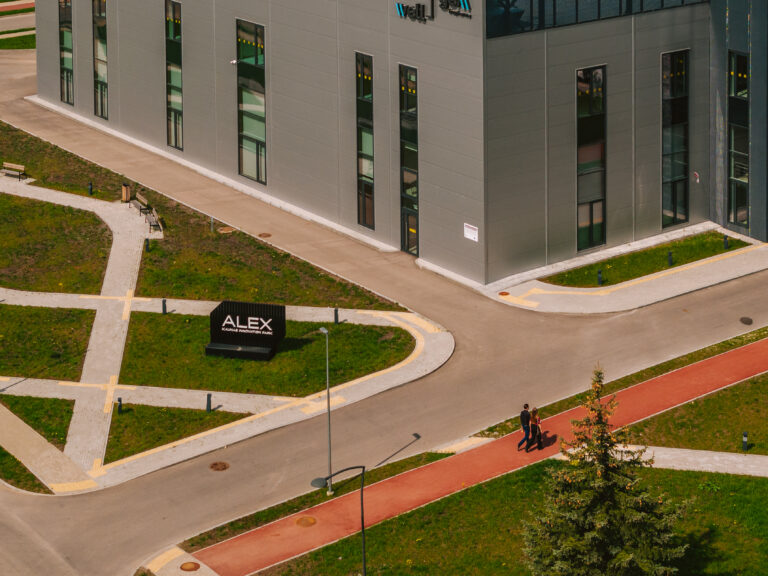The original interview was conducted by Vytautas Budzinauskas for BNS.LT
In an interview to BNS the VP Operations and Managing Director of Western Union Lithuania, Šarūnas Šuipis said that Western Union was particularly in favour of Lithuania and saw great potential for business service centre development here. However, to seize the potential, changes in the education system are necessary, and that is where new technologies could play a significant part.
“The Western world will continue to look at Central Europe for establishing business service centres because the price and quality ratio is great and Lithuania stays among the leading countries,” stated Š. Šuipis.
European Regional Operational Center (EUROC) celebrates its tenth anniversary. What were the most significant transformations during this period, and what has determined them?
After ten years, we see that our centre has become the largest company’s centre globally and is genuinely significant for Western Union’s (…) The same centre is in Costa Rica, and slightly smaller centres operate in the Philippines and Mexico.
We’ve noticed an exciting trend in Lithuania since the middle of the last year. The Western Union map has two colours – sending and receiving countries, depending on where and how much money people transfer. Since the restoration of the independence, Lithuania was the receiving country as Lithuanian emigrants in Great Britain, Norway, America and Germany used to send money to Lithuania via Western Union.
The tendency has changed since the last year: 52% of all the transactions now come from Lithuania and 48% – to Lithuania. The latter trend attests to the changing migration dynamics, improved economic condition, and country’s economic development (…) It is indeed an exciting turning point that shows the economic upswing.
Do you think this trend will prevail?
I do.
In the autumn of 2017, you opened the first customer service centre in Vilnius, and then you did not rule out the possibility of expansion. Last November, you announced an intention to create 300 new jobs. Is there any news?
Before the pandemic, we managed to create 115 new jobs – even the ones we didn’t have before: product development, operations support and other departments. These are new competencies, a new type of work that motivates us and encourages us to move forward.
The pandemic had some impact, but I would say the situation is now manageable, and we will continue to grow. I think that Western Union will keep expanding; the financial performance of Lithuanian service centre over the past decade demonstrates growth, our revenue in 2019 increased by around 4%. I think that despite the pandemic, we will retain similar or slightly lower growth this year. We will work profitably.
In the next two years, we plan to complete the expansion project. Again, we continuously increase our productivity – the key performance indicator – in all our operations. I am pleased with the robotics department. Robots perform the work that our employees don’t always like, and sometimes they execute specific processes even faster.
The financial services sector is advancing rapidly. New solutions appear regularly. What place for Western Union Lithuania you see in there? Are you going to offer any new services or maybe give something up?
We can combine electronic money and cash, and this is probably the advantage of Western Union over fintech companies globally, which provide an opportunity for customers to send and receive money exclusively through electronic channels.
Do you manage to find the required specialists?
We don’t face shortages, but our two key strategic areas, where we are quite active both via the Western Union Foundation and our interactions with universities and NGOs, are, at first, the situation in education and perhaps the reform that the country is reluctant to execute and, secondly, the migration processes which sometimes when comparing Lithuania with other countries, don’t contribute to our competitiveness.
Suppose it takes a week to get a work and residence permit in Poland, while in some cases it may take up to several months to get it in Lithuania. In that case, that makes an employee from Ukraine, a non-EU country, choose Poland over Lithuania.
How do you assess the business environment in the country – where does Lithuania still need to improve and what is excellent or even excellent here? What has determined the decision of Western Union to come to Lithuania?
The so-called talent potential primarily drove the decision – people who could provide services to the customers of Western Union around the world, who speak at least two or three foreign languages, have PC skills, etc. And we’ve made the right choice. Ten years later, the Western Union company continues to admire Lithuania. (…)
What could be improved?
As I’ve mentioned, education issues – so that the education system would meet the business needs of the future. The world is changing and digitalizing, and today we no longer work as we did 10-20 years ago.
I think the education system could also take advantage of the pandemic by bringing together the most talented 10-30 maths teachers – since one in three pupils unfortunately failed in maths exam – and provide lessons remotely by those best teachers. It means that all Lithuanian pupils would have an opportunity to learn from the best teachers. Is this possible? I think so, by using modern technologies.
And what about your competitors from Latvia and Estonia?
We don’t feel competitors breathing down our necks. However, our business priority is to remain competitive and to maintain high-quality standards. We are analyzing market trends, participate in various forums dedicated to GBS industry in Central Europe. Poland, Hungary, the Czech Republic, and other countries where the service centres have existed for almost 20-30 years, are probably those countries from which we can learn something new. But at the same time, I can see that they are learning from us too.
I don’t think that Lithuania is losing any of its competitive advantages. On the contrary, the price-quality ratio is exceptionally high, and the pandemic has once again shown that practically all service centres and the largest corporations in Lithuania were able to switch to working from home almost overnight. They started operating remotely and continue to provide quality services, that can’t be said, for example, about companies based in India, the Philippines and other Asian countries, as far as I’ve read in the press.
I think that, in the future, the Western world will continue scout locations in Central Europe for establishing service centres, because the price-quality ratio is excellent, and Lithuania is among the leading countries.
The establishment of the Western Union in Lithuania marked the arrival of global business services (GBS) in the country. Has this changed over the past decade? Are these services a long-term choice?
Invest Lithuania believes that the industry will grow, and I fully agree with them because the model of business service centres is the future of all large and even medium-sized corporations. (…) I think that this sector will continue to be one of the largest in the world and that Central Europe and Lithuania, where we are based, will be among the most significant players in the industry.
Thank you for the interview.
Read the original article here.













